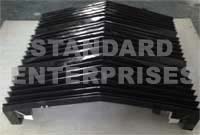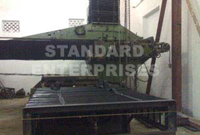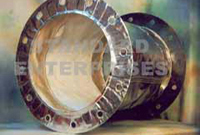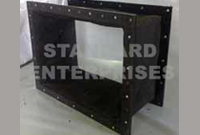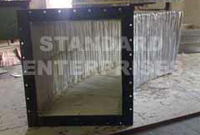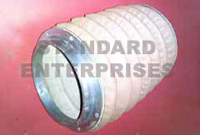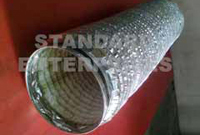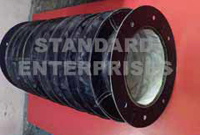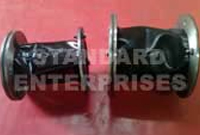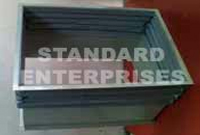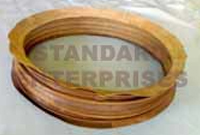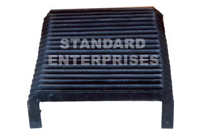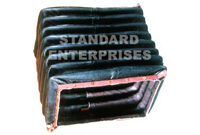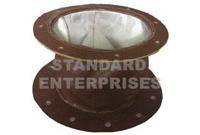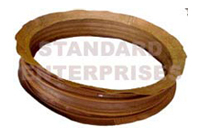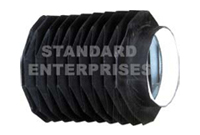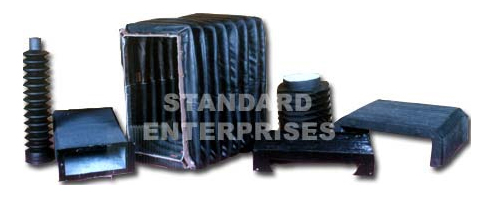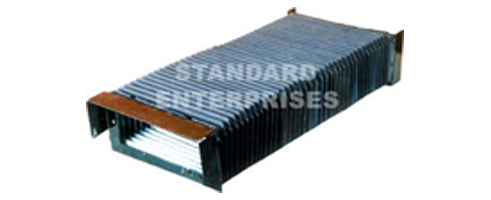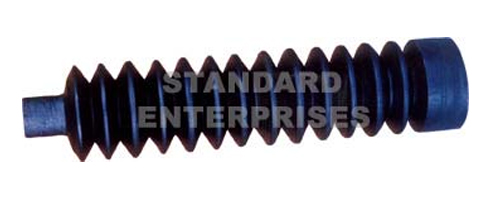Shapes : Circular, Rectangular, Hexagonal, Square, 'C' Type Etc.
Bellow Cover
Standard Bellows is a leading Manufacturer of all types of Non-Metallic Bellows & Covers used in all types of Industries.
A bellows cover is an essential mechanical device, and its design has been adapted to modern machinery and applications. The primary function of a bellows cover is to protect machine components, such as guideways and spindles, from dust, dirt, chips, and other contaminants. These covers are commonly used in machine tools, robotics, medical equipment, and other precision machinery.
Structure and Design of Bellow Cover
- Material : Bellows covers are typically made from a combination of fabric or plastic materials that are resistant to oil, coolants, and other machine-related fluids.
- Construction : They have folded or pleated sections that expand and contract, similar to an accordion.
- Support : Some bellows covers have internal support structures such as coils or rods to maintain their shape and prevent sagging.
Benefits of Bellow Cover
Bellows covers, also known as protective bellows, are devices often used in machinery to shield and protect moving parts and sensitive components from contamination and damage. They are typically made of fabric or rubber materials and can expand and retract with the motion of machinery. Here are some benefits of using bellows covers.
- Protection from Contaminants : Bellows covers act as a barrier, protecting machinery components from dust, dirt, chips, and other contaminants that could degrade performance or damage the equipment.
- Extend Equipment Lifespan : By preventing foreign particles from coming into contact with moving parts, bellows covers can extend the lifespan of equipment, reducing maintenance and replacement costs.
- Protection against Liquids : Many bellows are designed to be water and coolant resistant, which prevents these liquids from reaching critical machine components, thereby avoiding corrosion and damage.
- Heat Protection : Some specialized bellows covers can also protect machinery from extreme temperatures, which is essential in some high-heat industrial environments.
- Maintain Precision : By protecting precision machinery parts from contamination, bellows covers ensure that the machinery can continue to operate at its intended accuracy.
- Flexibility : Bellows covers are designed to be flexible, allowing them to move with the machinery without interfering with its operation. This flexibility makes them suitable for various applications, including linear and rotary motion.
- Space Efficiency : Due to their collapsible design, bellows covers don't consume much space, allowing for a compact machine design.
- Customizable : Bellows covers can be customized to fit specific machinery, ensuring maximum protection. Different materials can be chosen based on the requirements, such as resistance to chemicals, high temperatures, or UV light.
- Cost-Efficient : Compared to potential downtime and repair costs due to machinery damage, the investment in bellows covers is relatively low.
- Safety : In addition to protecting machinery, bellows covers can also contribute to a safer working environment. By containing splashes, sparks, or pinch points, they can help prevent injuries.
- Aesthetic Value : By keeping the machinery clean and free from visible wear, bellows covers can enhance the aesthetic value and professional appearance of the equipment.
- Easy Replacement : If a bellows cover wears out or gets damaged, it is generally easy and inexpensive to replace, compared to repairing or replacing the actual machinery component it was protecting.
Bellows covers are an essential accessory in many machinery settings, offering protection to both the equipment and the operators, while also contributing to cost savings and efficiency.
Applications of Bellow Cover
Bellows covers, also simply known as bellows, are protective covers that expand and contract in the same manner as an accordion. These covers are primarily used to protect equipment and machinery components from contaminants like dust, dirt, water, and chips. Bellows can be made of various materials, including fabric, rubber, and elastomers, depending on the specific application requirements.
Here are some notable applications of bellows covers
- Machine Tools : Protecting the moving parts, such as guideways and spindles, from abrasive contaminants can enhance machine life and accuracy. Examples include CNC machines, milling machines, and lathes.
- Linear Motion Systems : In linear actuators and rail systems, bellows protect the rods and shafts from external contaminants.
- Medical Equipment : Medical devices, such as surgical instruments or imaging equipment, often have precision components that need protection from contaminants or bodily fluids.
- Optical Systems : In precision optical instruments, like telescopes or microscopes, bellows can protect sensitive parts from dust and moisture.
- Cameras : Bellows are used in large format and some specialty cameras to allow flexible lens-to-film distances, which enable focus and perspective control.
- Measuring and Testing Equipment : In systems like coordinate measuring machines (CMM), bellows protect the moving parts from contaminants that can influence measurement accuracy.
- Laser Equipment : Bellows covers can be used to protect sensitive components from particles that could interfere with the laser's performance.
- Robotics : Robotic arms and joints can be shielded from contaminants, ensuring smooth operation and reducing wear.
- Elevators and Lifts : Some lift mechanisms employ bellows to prevent foreign particles from entering and affecting their functionality.
- Expansion Joints : In piping systems and ducts, bellows are used to accommodate thermal expansion or vibrations, ensuring that the systems remain sealed.
- Semiconductor Manufacturing : Semiconductor production environments require ultra-clean conditions. Bellows can be used to encase moving parts, preventing the emission of particles.
- Aerospace and Defense : They can protect sensitive components in aircraft, drones, or other defense systems from environmental contaminants.
- Flexing Seals : In industrial applications, bellows can act as a flexible seal around shafts or rods that move in and out, preventing the ingress of contaminants.
- Valves : In specific valve designs, bellows are used as seals to ensure that no leakage occurs.
When choosing a bellows cover for a particular application, it's essential to consider factors such as the expected temperature range, chemical resistance, required flexibility, and potential exposure to abrasive materials.
Maintenance of Bellow Cover
Bellows covers, also known as telescopic covers or protective covers, are devices used to protect machinery from dust, dirt, chips, oils, and other contaminants. They are commonly used in machine tools, robotics, and other precision machinery. Maintaining them is essential for the prolonged lifespan of both the cover and the machine it's protecting. Here's a simple guide to maintaining bellows covers
- Regular Inspection
- Always visually inspect the bellows cover for wear, tear, or damage.
- Check for any punctures, cracks, or splits in the fabric or material.
- Ensure that the guides, mounting, and support structures are intact.
- Clean Regularly
- Clean the bellows cover using a soft cloth or brush.
- Remove any debris, chips, or accumulated dust from the folds.
- If the bellows cover is stained with oil or coolant, clean it with a mild detergent and water. Ensure the cleaning solution doesn't damage the material. Rinse thoroughly and let it dry.
- Check the Motion
- Make sure that the bellows cover expands and collapses smoothly.
- If there is any resistance or snagging, investigate the cause. There might be foreign objects stuck in the folds or an issue with the supports or guides.
- Lubrication
- Some bellows covers, especially those made of metal, might require occasional lubrication. Use a light, non-staining lubricant suitable for the application.
- Ensure the lubricant doesn't affect the bellows' material.
- Replace Damaged Parts
- If any part of the bellows cover is damaged, replace it immediately. Small punctures or tears can be patched up temporarily, but a full replacement is advised for any significant damage.
- Ensure that replacement parts are compatible with your machine and the specific bellows cover model.
- Avoid Overextension
- Make sure that the bellows cover is not overextended during machine operation. This can cause premature wear and failure.
- Environmental Factors
- Ensure that the bellows cover material is suitable for the environment. For instance, if the machine operates in a corrosive environment, the bellows cover material should be resistant to those chemicals.
- Spare Parts
- Always keep a set of spare parts handy, especially if the machine operates continuously. This ensures minimal downtime in case of unexpected damage.
- Review Manufacturer's Guidelines
- Always consult the manufacturer's maintenance guide or user manual for specific maintenance requirements related to the bellows cover's material and design.
By adhering to these maintenance tips and conducting regular checks, you can ensure that your bellows covers last longer and provide effective protection for your machinery.
Selection Criteria
- Determine the type of contaminants it will face.
- Decide on the required material based on chemical resistance needs.
- Measure the range of motion to ensure the bellows can expand and contract adequately.
- Take note of temperature and environmental conditions.
- Consider ease of installation.
Conclusion
Bellows covers might seem like simple components, but they play a crucial role in extending the life of machinery, ensuring operational efficiency, and reducing maintenance needs. As machinery evolves and becomes more sophisticated, the design and capabilities of bellows covers continue to advance to meet the needs of modern applications.

